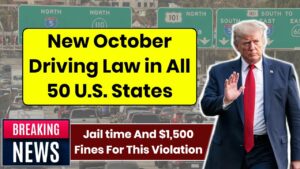Join on WhatsApp
Get the latest updates directly on WhatsApp – motivation, news & more!
Come October 2025, America’s roadways will quietly enter a new phase—one designed to protect safety and dignity. The Department of Transportation (DOT) is officially overhauling how older drivers renew their licenses, targeting those aged 70 and above. For millions of seniors who still drive to the grocery store, doctor, or grandkids’ soccer game, the new framework isn’t about taking away keys—it’s about keeping them safe behind the wheel for as long as possible.
Why the Rules Are Changing
Let’s look at the hard truth: the U.S. is aging fast. The Federal Highway Administration reports that nearly 48 million Americans over 65 currently hold active driver’s licenses—a record number. By the mid-2030s, Census Bureau data projects that seniors will outnumber children for the first time in U.S. history. That demographic shift means more older drivers on the road, and naturally, more scrutiny around reaction times, vision, and cognitive health.
Historically, states have managed senior driver renewals on their own—some with stricter tests, others barely checking a vision chart. The new federal framework, set for rollout in October 2025, creates consistency across all states while leaving room for local adaptation. It’s not a federal takeover—it’s a coordinated tune-up.
How the New Tiered System Works
Forget the old one-size-fits-all renewals. The DOT’s plan introduces tiered renewal cycles and testing that adjust with age. The system scales requirements as drivers get older, with flexibility built in for those in good health.
| Age Group | Renewal Frequency | Testing Requirements |
|---|---|---|
| 70–79 | Every 4 years | Vision test at each renewal |
| 80–86 | Every 2 years | Vision + cognitive screening if flagged |
| 87+ | Every year | Mandatory road test + medical clearance if needed |
The most important part? No one loses their license just for turning a certain age. The system prioritizes ability, not date of birth.
Who Can Raise Concerns
The DOT’s framework also creates a structured reporting process for potential safety issues. The aim isn’t to “snitch” on grandma—it’s to intervene before something dangerous happens.
Here’s who can flag a concern:
- Family members who notice missed stop signs or close calls.
- Doctors aware of medical conditions that might impair driving (like seizures, dementia, or poor vision).
- Law enforcement after traffic stops or accidents suggesting diminished capability.
Once flagged, the DMV reviews the case. A driver might be asked to complete a medical evaluation or a road reassessment, not have their license yanked overnight. This gradual, evidence-based approach keeps the process fair and transparent.
State Flexibility Still Matters
Even with a federal baseline, states retain authority to fine-tune their systems. Some are already planning their own twists:
- California may allow telehealth evaluations for seniors needing doctor sign-offs, easing travel for those in rural areas.
- Florida is exploring reaction-time screenings for drivers aged 80 and up.
- New York is considering subsidized refresher courses to help older drivers pass renewal tests confidently.
For personalized updates, drivers should check their state’s DMV listing via USA.gov.
Preparing for October 2025
October might sound far away, but seniors and families should start prepping now. Experts suggest a few proactive steps:
- Get annual eye exams. Don’t wait for a renewal letter to learn your vision needs correction.
- Keep medical records updated. Conditions like diabetes, Parkinson’s, or epilepsy can trigger review requests.
- Take a defensive driving course. Refresher programs often lower insurance costs, too.
- Have open conversations with family. Knowing when to reduce driving can prevent tough confrontations later.
Restricted Licenses: Finding Middle Ground
Losing a full license can feel devastating—but restricted licenses are becoming the go-to compromise. Instead of total revocation, drivers may be limited to:
- Daytime driving only
- Trips within a defined local area
- Avoiding highways or interstates
- Driving with another licensed passenger
This tiered approach mirrors systems used successfully in Canada and the U.K., where restricted licensing has reduced senior-involved crashes without sidelining older citizens completely.
Beyond the Wheel: Keeping Mobility Alive
Not everyone will stay behind the wheel forever—but that doesn’t mean losing independence. Across the U.S., transportation networks are slowly evolving to support aging communities:
- Ride-share programs like Lyft and Uber are piloting senior discount partnerships in cities from Phoenix to Boston.
- On-demand shuttles for rural or suburban areas—often funded by state transit grants—offer affordable local rides.
- Volunteer driver programs, backed by nonprofits, help seniors get to medical appointments or grocery stores at little or no cost.
Agencies like the National Aging and Disability Transportation Center are working to expand these networks nationwide by 2026, recognizing that mobility equals independence.
Why It Matters
For many Americans, a driver’s license is more than plastic—it’s freedom. But with freedom comes responsibility, and the new DOT framework strikes that delicate balance. It respects the reality that older drivers aren’t a monolith. Some 85-year-olds drive better than 60-year-olds. The rules simply ensure that those who should be on the road can stay there safely.
Come next fall, seniors won’t just face new tests—they’ll face a cultural shift. Driving will become less about entitlement and more about shared safety. And that’s a future everyone can live with.
FAQs
When do the new senior driver rules take effect?
They’re set to begin nationally in October 2025, with some states phasing in earlier under pilot programs.
Will everyone over 70 need a road test?
No. Only drivers 87 and older will face mandatory road tests. Those under 87 will primarily complete vision and health screenings.
What if a driver fails the renewal test?
Options include restricted licenses, re-tests, or medical follow-ups. Full suspension is rare and typically follows repeated failed assessments.
Can a family member trigger a DMV review?
Yes. Families can confidentially report safety concerns, which the DMV reviews before taking any action.
Are there national exemptions or waivers?
Certain exemptions may apply to veterans or medically monitored drivers who pass independent safety evaluations, depending on state laws.




